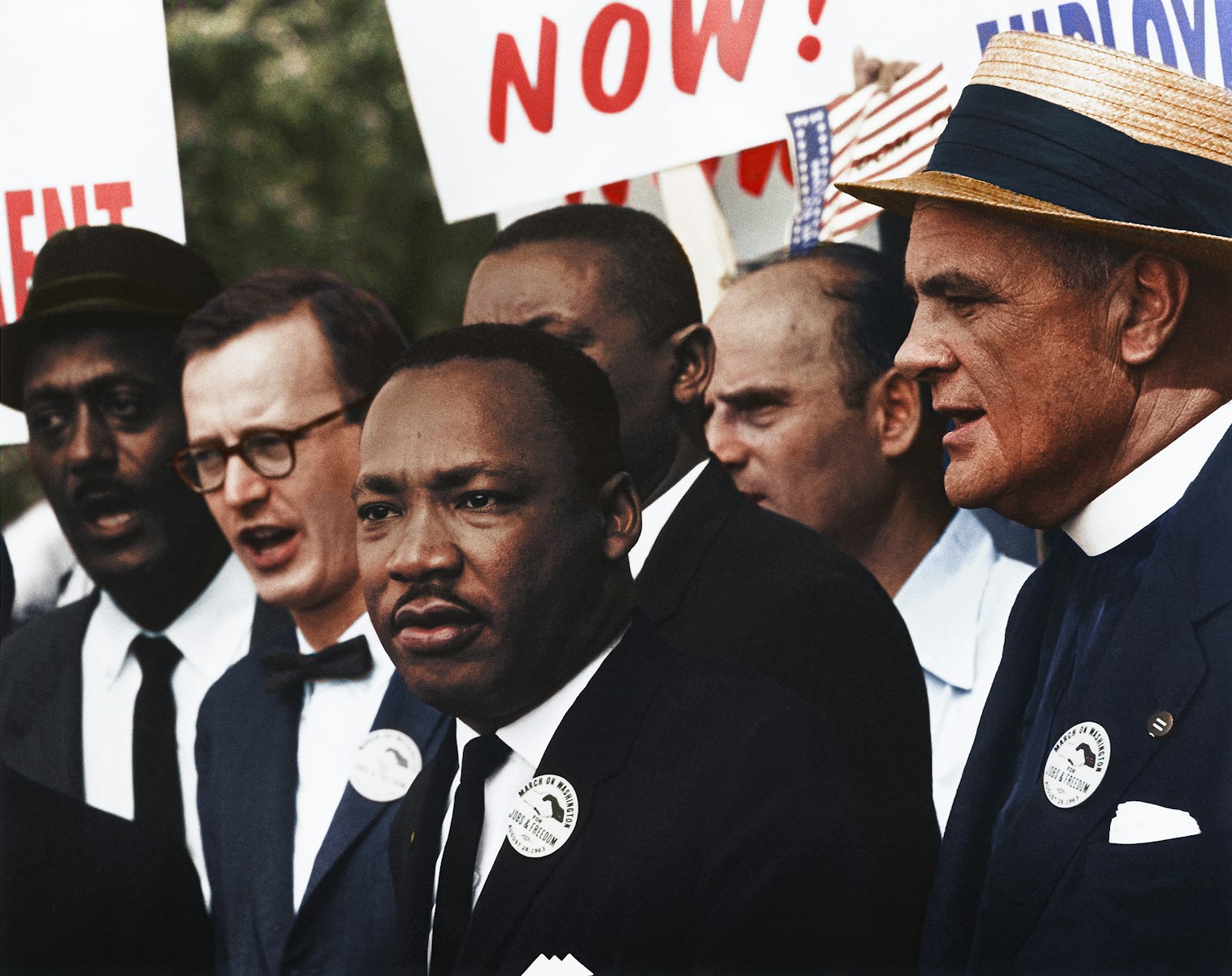
Martin Luther King, Jr. and civil rights leaders at the March on Washington.
Photograph by Unseen Histories via Unsplash. Original black and white negative by Rowland Scherman. Taken August 28th, 1963, Washington DC, United States (The National Archives and Records Administration). Colorized by Jordan J. Lloyd. U.S. Information Agency. Press and Publications Service.
The faith and social justice paradox
Faith and social justice interweave into a seemingly impossible paradox. On the one hand, an unwavering faith holds fast to the belief in the best possible outcome. On the other, the pursuit of social justice confronts the ever-present brutal facts of reality that the situation may be pretty bad and perhaps even making strides in reverse. Both happen simultaneously.
The Cambridge Dictionary defines paradox as “a statement or situation that may be true but seems impossible or difficult to understand because it contains two opposite facts or characteristics.” It’s like trying to understand how two things can’t both be true at the same time, can they? Well, yes, they can. That is the nature of a paradox. As people of faith who care about justice, we may be required to embrace both faith, hope, and hard reality at the same time. With issues like racial justice, climate change, oppression of LGBTQ people, homelessness, or the lack of help for people with mental health issues, people of faith despair over how bad things are but at the same time maintain a steadfast faith that there is hope for improvement. It is a testament to the power of Christianity that our faith can encompass both opposites at the same time.
The business world often thrives best when it handles paradox successfully. In his now classic work Good to Great where he studied good companies and great companies and tried to understand how a company moved from being good to becoming great, Jim Collins wrote: “The Stockdale Paradox is a concept, along with its companion concept Confront the Brutal Facts, developed in the book Good to Great. Productive change begins when you confront the brutal facts. Every good-to-great company embraced what we came to call the ‘Stockdale Paradox’: you must maintain unwavering faith that you can and will prevail in the end, regardless of the difficulties, and at the same time, have the discipline to confront the most brutal facts of your current reality, whatever they might be.”
Collins further explained the Stockdale Paradox: “Every good-to-great company faced significant adversity along the way to greatness, of one sort or another. … In every case, the management team responded with a powerful psychological duality. On the one hand, they stoically accepted the brutal facts of reality. On the other hand, they maintained an unwavering faith in the endgame, and a commitment to prevail as a great company despite the brutal facts. We came to call this duality the Stockdale Paradox. The name refers to Admiral Jim Stockdale, who was the highest-ranking United States military officer in the ‘Hanoi Hilton’ prisoner-of-war camp during the height of the Vietnam War. Tortured over twenty times during his eight-year imprisonment from 1965 to 1973, Stockdale lived out the war without any prisoner’s rights, no set release date, and no certainty as to whether he would even survive to see his family again.” Collins met and interviewed Stockdale and asked him how he survived. Stockdale told him, “I never lost faith in the end of the story. I never doubted not only that I would get out, but also that I would prevail in the end and turn the experience into the defining event of my life, which, in retrospect, I would not trade.”
As people of faith who care about justice, we may be required to embrace both faith, hope, and hard reality at the same time. May we confront the brutal facts of reality, but maintain an unwavering faith and hope that good will prevail.
Paradox exists, yet paradox works. In business, the Stockdale Paradox advises confronting the brutal facts of reality. Things may be bad. Solutions may seem elusive. The chart is pointed downward. And yet, never, never give up the belief that you can and you will prevail in the end, regardless of difficulties. In the pursuit of social justice, again confront the brutal facts of reality. Things are bad and may even be going in the wrong direction. But, never, never give up the belief that you can and you will prevail in the end, regardless of the adversity.
Winston Churchill returned to his alma mater in 1941 to tell them… “never give in, never give in, never, never, never, never-in nothing, great or small, large or petty — never give in except to convictions of honor and good sense. Never yield to force; never yield to the apparently overwhelming might of the enemy.” And then, the students created for him a song, proclaiming “Though long the fight we know that right, Will triumph in the end, Sir!” That could be a song for those who labor, speak for, stand with, and advocate for social justice: never give in, never give in, never, never, never, never – in nothing, great or small, large or petty, never give in. We will triumph in the end. We shall overcome. When confronted with the paradox, when the cause seems to stand still or even fail, never give in except for the faith and the hope we have in the light of the world and that we will triumph in the end.
Martin Luther King, Jr. stood as a hope, a dream, and a model for those who carry on the work for the good, the true, the kind, and the compassionate. In his Nobel Prize speech, he confronted the brutal reality that the work was not done, and the hatred and bigotry remained rampant. Yet, he refused to give up hope:
“I accept this award today with an abiding faith in America and an audacious faith in the future of mankind. I refuse to accept despair as the final response to the ambiguities of history. I refuse to accept the idea that the ‘isness’ of man’s present nature makes him morally incapable of reaching up for the eternal ‘oughtness’ that forever confronts him. I refuse to accept the idea that man is mere flotsam and jetsam in the river of life, unable to influence the unfolding events which surround him. I refuse to accept the view that mankind is so tragically bound to the starless midnight of racism and war that the bright daybreak of peace and brotherhood can never become a reality.”
King lived this paradox: confront the brutal facts of reality, but maintain an unwavering faith and hope that good will prevail. May we do the same.
Rev. John Zehring has served United Church of Christ congregations for 22 years as a pastor in Massachusetts, Rhode Island, and Maine. He is the author of more than 30 books and e-books. His most recent book from Judson Press is “Get Your Church Ready to Grow: A Guide to Building Attendance and Participation.”
The views expressed are those of the author and not necessarily those of American Baptist Home Mission Societies.



